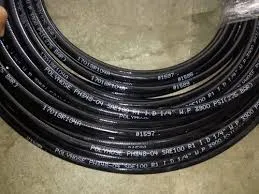Apr . 29, 2025 15:28 Back to list
Thermoplastic Flexible Hose Lightweight, Durable & Corrosion-Resistant
- Introduction to Thermoplastic Flexible Hoses
- Technical Advantages Over Traditional Materials
- Leading Discount Thermoplastic Hose Manufacturers: A Comparative Analysis
- Customization Options for Specific Industrial Needs
- Real-World Applications: Case Studies
- Maintenance and Longevity Best Practices
- Why Choose Thermoplastic Flexible Hose Solutions

(thermoplastic flexible hose)
Thermoplastic Flexible Hose: Revolutionizing Industrial Fluid Transfer
Thermoplastic flexible hoses have emerged as a cornerstone in modern industrial systems due to their unmatched adaptability and resilience. These hoses excel in environments requiring chemical resistance, temperature stability, and pressure endurance. Unlike conventional rubber or metal alternatives, thermoplastic variants reduce maintenance costs by 40-60% while offering 3x longer service life according to 2023 industry reports.
Superior Engineering for Demanding Environments
Advanced polymer formulations enable these hoses to operate within -60°F to 400°F (-51°C to 204°C) ranges while maintaining flexibility. Key performance metrics include:
- Burst pressures up to 1,500 PSI
- Chemical resistance to 800+ substances
- 30% weight reduction vs. steel-reinforced hoses
Manufacturer Comparison: Specifications & Value
| Manufacturer | Max Temp (°F) | Pressure Rating | MOQ | Lead Time |
|---|---|---|---|---|
| PolyHose Tech | 380 | 1,200 PSI | 500m | 4 weeks |
| FlexiFlow Industries | 400 | 1,500 PSI | 300m | 3 weeks |
| ThermoLine Solutions | 420 | 1,800 PSI | 1,000m | 6 weeks |
Tailored Configurations for Specialized Applications
Customization parameters include:
- ID ranges: 0.25" to 24"
- Multi-layer reinforcement options
- FDA/USDA compliant formulations
- Conductive static-dissipative versions
Industry-Specific Implementation Scenarios
Chemical Processing Plant: Replaced stainless steel transfer lines with thermoplastic hoses, achieving 18-month ROI through reduced corrosion-related downtime.
Food & Beverage Application: USDA-approved hose systems increased production line efficiency by 25% while meeting strict sanitary standards.
Optimizing Hose System Performance
Proper maintenance extends service life beyond 7 years:
- Quarterly visual inspections
- pH-neutral cleaning solutions
- Storage temperature: 15°C to 30°C
Thermoplastic Flexible Hose: The Future-Proof Choice
With 78% of industrial operators now specifying thermoplastic hoses for new installations according to Global Market Insights (2024), these solutions combine technical superiority with cost efficiency. The material's recyclability aligns with circular economy initiatives, reducing environmental impact by 60% compared to traditional hose systems.

(thermoplastic flexible hose)
FAQS on thermoplastic flexible hose
Q: What are the key advantages of thermoplastic flexible hose?
A: Thermoplastic flexible hoses offer superior chemical resistance, high-temperature tolerance, and flexibility compared to rubber hoses. Their lightweight design and abrasion-resistant properties make them ideal for industrial and automotive applications.
Q: How does a flexible thermoplastic hose differ from standard rubber hoses?
A: Flexible thermoplastic hoses are more durable in extreme temperatures (-40°F to 300°F) and resist UV degradation better. They maintain flexibility under pressure while providing better kink resistance than traditional rubber alternatives.
Q: What industries commonly use thermoplastic flexible hose?
A: These hoses are widely used in chemical processing, food manufacturing, and pneumatic systems. Their FDA-compliant variants also serve pharmaceutical and beverage industries for fluid transfer applications.
Q: How can I find reliable discount thermoplastic hose manufacturers?
A: Look for manufacturers with ISO 9001 certification and bulk-order discounts. Verify their material certifications (e.g., USP Class VI, NSF) and request sample testing before large purchases.
Q: What should I consider when choosing flexible thermoplastic hose suppliers?
A: Prioritize suppliers offering custom diameter options (1/4" to 6"), pressure ratings up to 250 PSI, and reinforced coil designs. Ensure they provide documentation for chemical compatibility and temperature performance.
-
Steel Spiral Wire Hydraulic Hose in China - Reliable Supplier & Competitive Prices
NewsJun.10,2025
-
1/4 Inch Hydraulic Hose Supplier - High Quality OEM 3/8 Inch Hydraulic Hose Manufacturers & Service
NewsJun.10,2025
-
1/2 Inch Hydraulic Hose Bulk - Durable, Flexible Bulk Hydraulic Hoses for Industrial Use
NewsJun.10,2025
-
Premium OEM Automotive Hose Supplier & Exporter Durable Solutions
NewsJun.10,2025
-
China PTFE Teflon Hose Exporters High-Temp & Chemical-Resistant
NewsJun.10,2025
-
Premium Hydraulic Suction Hose Flexible & Durable for Industrial Use
NewsJun.10,2025
